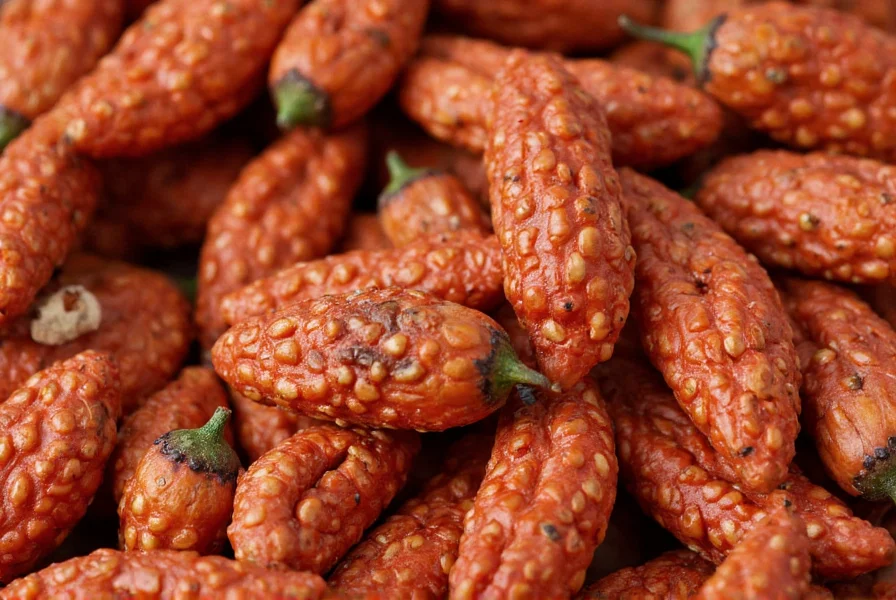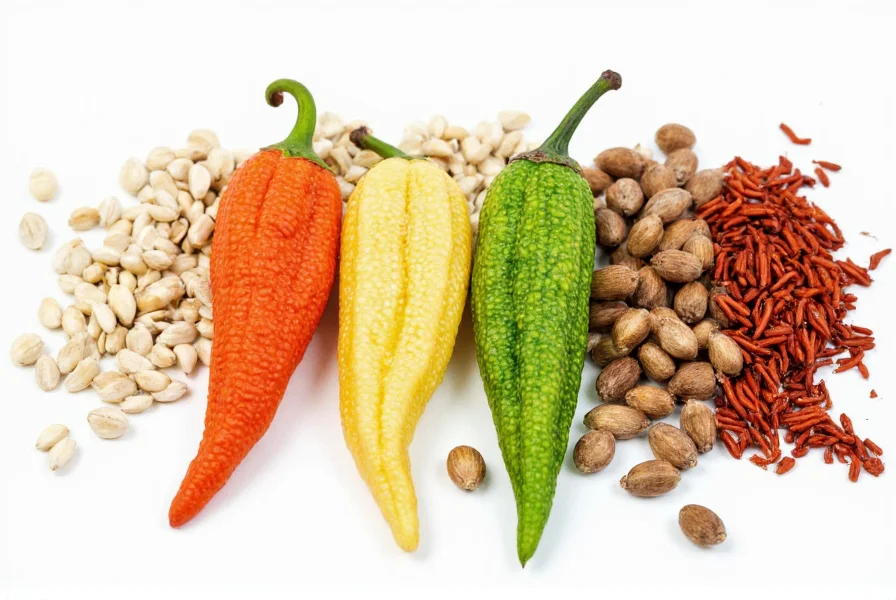What Exactly Is Alligator Pepper?
Alligator pepper, scientifically classified as Aframomum melegueta, represents one of Africa's most culturally significant spices. Despite its misleading name, this botanical wonder shares no relation to alligators or conventional black pepper. The name likely originated from the pod's textured appearance resembling reptile skin. Native to Ghana, Nigeria, and other West African regions, alligator pepper has been integral to local culinary and medicinal practices for centuries.
This spice emerges from a perennial herb reaching 1-2 meters in height, producing striking red pods containing small, reddish-brown seeds. When dried, these seeds develop their characteristic pungent aroma and complex flavor profile that distinguishes them from common black pepper. Understanding what is alligator pepper requires recognizing its botanical classification within the Zingiberaceae family, making it a relative of ginger and cardamom rather than true pepper.

Historical Significance and Cultural Importance
Alligator pepper's journey through history reveals its profound cultural significance across West Africa. Traditional Igbo communities in Nigeria refer to it as ose ounj, incorporating it into ceremonial practices and hospitality rituals. In Ghana, it's known as hwentia and features prominently in local dishes and traditional medicine systems.
European traders during the Middle Ages valued alligator pepper as a luxury commodity, often substituting it for black pepper when supplies were scarce. Historical records indicate its use in medieval European brewing and baking, though it eventually lost prominence to black pepper as trade routes expanded. Today, alligator pepper traditional uses continue to thrive in West African communities, where it remains a symbol of hospitality and cultural identity.
Botanical Characteristics and Identification
Identifying authentic alligator pepper requires understanding its distinctive physical properties. The mature pods measure approximately 5-7 cm in length, featuring a rough, textured surface that gives rise to its common name. Each pod contains numerous small, reddish-brown seeds arranged in a circular pattern. When crushed, these seeds release volatile compounds including gingerol, shogaol, and 6-paradol, contributing to the spice's complex sensory profile.
| Characteristic | Alligator Pepper | Black Pepper | Grains of Paradise |
|---|---|---|---|
| Botanical Family | Zingiberaceae | Piperaceae | Zingiberaceae |
| Primary Flavor Notes | Citrus, floral, woody, peppery | Sharp, pungent, earthy | Lemon, floral, cardamom-like |
| Active Compounds | 6-paradol, gingerol | Piperine | 6-paradol, terpenes |
| Geographic Origin | West Africa | Southern India | West Africa |
Culinary Applications and Flavor Profile
Chefs and home cooks seeking authentic West African flavors rely on alligator pepper for its unique contribution to dishes. Unlike black pepper's straightforward heat, how to use alligator pepper in cooking involves understanding its layered flavor development. The spice offers initial citrus notes followed by floral undertones and a warm, lingering heat that builds gradually.
In traditional Nigerian cuisine, cooks incorporate whole pods into soups and stews, removing them before serving similar to bay leaves. Ground seeds feature prominently in spice blends like ogbono and ehi riri. Modern culinary applications extend beyond African cooking—chefs use it to enhance chocolate desserts, infuse spirits, and add complexity to meat rubs. When substituting for black pepper, use approximately half the quantity due to its more intense flavor profile.

Scientific Research on Health Benefits
Emerging scientific research supports many traditional claims about alligator pepper health benefits. Studies published in the Journal of Ethnopharmacology indicate that compounds in alligator pepper demonstrate significant antioxidant activity, potentially exceeding that of conventional black pepper. The presence of 6-paradol, a ginger-related compound, shows promise in preliminary research for its anti-inflammatory properties.
Traditional medicinal applications include using alligator pepper for digestive issues, respiratory conditions, and as an antimicrobial agent. While promising, researchers emphasize that most current evidence comes from in vitro studies or traditional use documentation. More clinical research is needed to confirm specific therapeutic applications. As with any botanical remedy, consult healthcare professionals before using alligator pepper for medicinal purposes, especially if taking medications or managing health conditions.
Where to Find and How to Store Alligator Pepper
Finding authentic alligator pepper requires knowing where to look. Specialty African grocery stores typically carry whole pods or ground versions. Online retailers specializing in global spices offer another reliable source for those wondering where to buy alligator pepper. When purchasing, look for plump, reddish-brown pods with intact seeds—avoid products showing signs of moisture damage or discoloration.
Proper storage maintains alligator pepper's potency and extends shelf life. Keep whole pods in an airtight container away from light and heat, where they'll retain quality for 12-18 months. Ground versions lose potency more quickly, remaining flavorful for 6-8 months under optimal conditions. For maximum flavor impact, consider grinding whole seeds immediately before use rather than purchasing pre-ground versions.
Comparing Alligator Pepper to Similar Spices
Understanding the differences between alligator pepper and related spices prevents culinary confusion. While often called grains of paradise substitute, alligator pepper actually represents the authentic source of what Europeans historically labeled "grains of paradise." True grains of paradise (Aframomum granum-paradisi) come from a closely related but distinct species.
Compared to black pepper, alligator pepper offers a more complex flavor profile with less intense heat. Its citrus and floral notes make it particularly valuable in dishes where black pepper might overwhelm other flavors. Unlike pink peppercorns (which come from a completely different plant family), alligator pepper belongs to the ginger family, sharing chemical compounds with ginger and cardamom that contribute to its distinctive taste.
Practical Usage Tips for Home Cooks
Integrating alligator pepper into your cooking repertoire requires some technique. For soups and stews, add whole pods early in the cooking process to allow flavors to infuse gradually. Remove before serving as the pods themselves remain too fibrous to consume. When using ground alligator pepper, start with small quantities—¼ teaspoon typically suffices for four servings—and adjust to taste.
Creative applications extend beyond savory dishes. Try adding a pinch to chocolate-based desserts for unexpected complexity, or infuse it into simple syrup for unique cocktails. The spice pairs particularly well with root vegetables, game meats, and tropical fruits. For those exploring alligator pepper vs black pepper applications, remember that alligator pepper works best when you want nuanced heat rather than straightforward pungency.
Safety Considerations and Potential Side Effects
While generally recognized as safe for culinary use, alligator pepper warrants some precautions. Consuming excessive amounts may cause gastrointestinal discomfort in sensitive individuals. Those with known allergies to ginger or related plants should exercise caution when trying alligator pepper for the first time.
Pregnant and breastfeeding women should consult healthcare providers before using alligator pepper medicinally, though culinary quantities typically pose no risk. The spice may interact with certain medications, particularly blood thinners, due to potential effects on blood clotting. As with any botanical product, moderation remains key—enjoy alligator pepper as part of a varied diet rather than consuming it in excessive quantities.
FAQ
What is the difference between alligator pepper and grains of paradise?
Alligator pepper (Aframomum melegueta) is the authentic source of what Europeans historically called "grains of paradise." While the terms are often used interchangeably, true grains of paradise technically refer to Aframomum granum-paradisi, a closely related but distinct species. Both share similar flavor profiles, but alligator pepper typically has more pronounced citrus notes.
Can I substitute alligator pepper for black pepper in recipes?
Yes, but with adjustments. Alligator pepper has a more complex flavor profile with citrus and floral notes alongside its heat. Use approximately half the amount of alligator pepper compared to black pepper, as its flavor is more intense. It works particularly well in dishes where you want nuanced heat rather than straightforward pungency.
How should I store alligator pepper to maintain freshness?
Store whole alligator pepper pods in an airtight container away from light and heat, where they'll retain quality for 12-18 months. Ground versions lose potency more quickly, remaining flavorful for 6-8 months under optimal conditions. For maximum flavor impact, grind whole seeds immediately before use rather than purchasing pre-ground versions.
Are there any health benefits associated with alligator pepper?
Research indicates alligator pepper contains compounds with antioxidant and potential anti-inflammatory properties. Traditional medicinal applications include using it for digestive issues and respiratory conditions. However, most current evidence comes from in vitro studies, and more clinical research is needed to confirm specific therapeutic applications. Culinary use is generally safe, but consult healthcare professionals before using it medicinally.
Where can I purchase authentic alligator pepper?
Authentic alligator pepper is available at specialty African grocery stores, which typically carry whole pods or ground versions. Online retailers specializing in global spices offer another reliable source. When purchasing, look for plump, reddish-brown pods with intact seeds, and avoid products showing signs of moisture damage or discoloration for the best quality.










 浙公网安备
33010002000092号
浙公网安备
33010002000092号 浙B2-20120091-4
浙B2-20120091-4